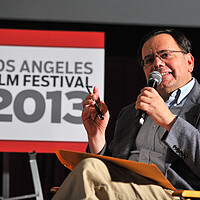Scenes from a marriage – at a breaking point
Loading...
A good courtroom drama must always be about more than what occurs in the courtroom. The human drama of the protagonists, what brought them to trial in the first place, should constitute the essence of the action.
In this sense, “Anatomy of a Fall” – the winner of the 2023 Palme d’Or at Cannes, that festival’s highest honor – is exemplary.
Why We Wrote This
A story focused onWhat really resonates in the award-winning film “Anatomy of a Fall” is how a son must cope with the dissection of his parents’ marriage at an age when most children cannot comprehend the pain two people can inflict on each other.
Sandra Voyter (Sandra Hüller) is an acclaimed German novelist known for drawing on her own life experiences in her fiction. She is living with her author husband, Samuel Maleski (Samuel Theis), and their 11-year-old son, Daniel (Milo Machado Graner), in a remote village in the French Alps.
It’s clear from the discordant opening scene that the couple is not exactly in a state of domestic bliss. A reporter has come to interview Sandra, and from upstairs, Samuel, whom we never see, is blaring deafening music, as if to drown out the session. Sometime later, Daniel, who is partially sighted, comes upon his father splayed in the snow, apparently dead from a fall from atop their chalet. His head wound may or may not have been a result of the fall. Did he jump or was he pushed?
A good courtroom drama must always be about more than what occurs in the courtroom. The human drama of the protagonists, what brought them to trial in the first place, should constitute the essence of the action.
In this sense, “Anatomy of a Fall” – the winner of the 2023 Palme d’Or at Cannes, that festival’s highest honor – is exemplary. The outcome of the trial is, in a way, the movie’s least riveting aspect.
As presented to us, the circumstances of the trial are deliberately ambiguous. Sandra Voyter (Sandra Hüller), an acclaimed German novelist known for drawing on her own life experiences in her fiction, is living with her author husband, Samuel Maleski (Samuel Theis), and their 11-year-old son, Daniel (Milo Machado Graner), in a remote village in the French Alps.
Why We Wrote This
A story focused onWhat really resonates in the award-winning film “Anatomy of a Fall” is how a son must cope with the dissection of his parents’ marriage at an age when most children cannot comprehend the pain two people can inflict on each other.
It’s clear from the discordant opening scene that the couple is not exactly in a state of domestic bliss. A reporter has come to interview Sandra, and from upstairs, Samuel, whom we never see, is blaring deafening music, as if to drown out the session. Sometime later, Daniel, who is partially sighted, comes upon his father splayed in the snow, apparently dead from a fall from atop their chalet. His head wound may or may not have been a result of the fall. Did he jump or was he pushed?
At first, the focus is almost entirely on Sandra, who immediately becomes a prime suspect. As is standard in these types of scenarios, we are placed in the position of judging her. Sandra maintains her innocence, based not only on partial information and conflicting testimony but also on a deeper level, by examining her every facial flicker for clues. Director Justine Triet, who co-wrote the script with her partner, Arthur Harari, chose the lead actress well: Hüller is expressively inscrutable.
Not once did I detect her signaling an “aha!” moment to the audience. Hüller gives nothing away, and yet the interiority of her performance – the way she can communicate the deepest feelings with the barest of nuances – is uncanny.
Her performance is matched, though smaller in scope, by Machado Graner as Sandra’s son. Daniel is an industrious kid who is never presented as a victim of infirmity. In the process of rooting out the truths from the half-truths and the unknowables, Daniel becomes the trial’s unwitting centerpiece. But what really resonates in the film is how, in responding to recorded tapes of a vicious marital spat, he must cope with the dissection of his parents’ marriage at an age when most children cannot comprehend the pain that two people can inflict on each other.
The strongest scene in the movie is the enactment, in flashback, of that fight. It’s a scene that rivals anything in Ingmar Bergman’s television miniseries “Scenes From a Marriage.” Sandra and Samuel go at each other in a way that only two people who are intimately bound by love and hate and blame can achieve. The scene, among much else, is also a furious depiction of how two artists, joined together, can both support and prey on each other’s creativity.
The film is very good at laying out the forensics of the case, but Triet is after something larger. I’m not sure she altogether succeeds: She wants to show how Sandra is being judged not just for the murder but, in effect, for everything – for her failures as a mother, a lover, an artist. We are being asked to judge the society that judges her. We are also nudged to contemplate that old philosophical chestnut: What is truth?
This is all a bit too much baggage. Perhaps Triet felt she needed to enlarge the film’s scope in order to distinguish it from the countless courtroom dramas that flood our screens. If so, she needn’t have worried. What she has otherwise given us is a superbly acted and directed procedural with powerful psychological grounding. That’s plenty.
Peter Rainer is the Monitor’s film critic. “Anatomy of a Fall” is rated R for some language, sexual references, and violent images.








